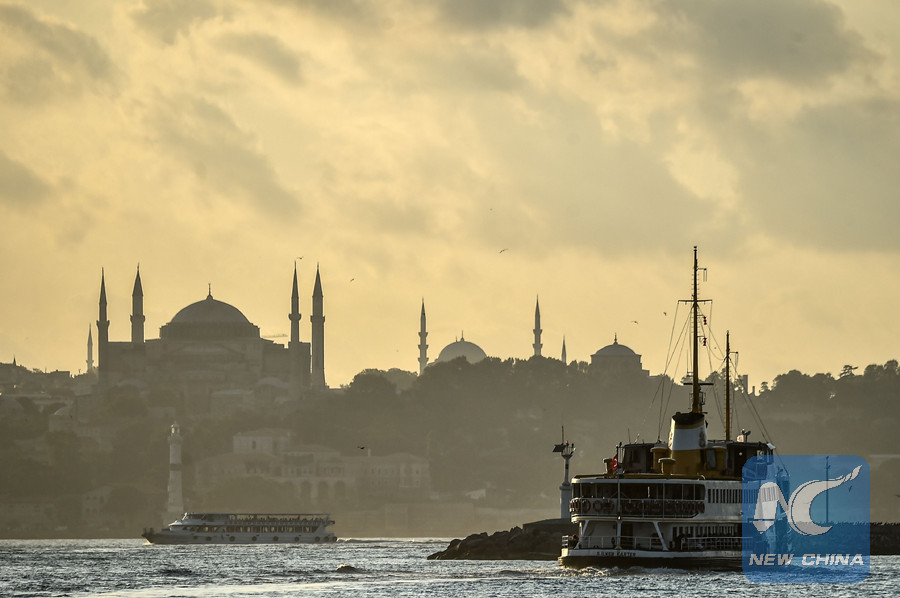
A ferryboat crosses the Bosphorus as the Hagia Sophia appears in the background on August 17, 2017 in Istanbul. (AFP PHOTO)
by Burak Akinci
ANKARA, Aug. 19 (Xinhua) -- Istanbul, Turkey's biggest city and economic heartland with 18 million inhabitants and thousands of tourists, could be hit any time by a massive earthquake with devastating effects, researchers warned amid heavy fears that the historic megapolis is not prepared with its substandard buildings.
On Aug. 17 1999, a 7.5-magnitude earthquake hit in the middle of the night Izmit, 70 km southeast of Istanbul, killing more than 17,000 people, according to an official death toll, while experts estimated up to 45,000 human losses.
Many residents were asleep and had no chance of escape. About 50,000 people were injured, over 285,000 buildings were damaged, and 600,000 were homeless after the 45-second tremor that left deep social and economic wounds to the country.
Academics predicted that a huge earthquake is imminent on the North Anatolian Fault line. The Marmara section of this line has been peaceful since 1776, while it is known that there is a rupture on the fault every 250 years based on historical records.
Such a hellish scenario would kill up to 90,000 people, and make around half a million homeless, according to specialists.
Professor Celal Sengor from the Istanbul Technical University, a renowned Turkish earthquake expert, stated on Wednesday that the "big one," an earthquake of magnitude 7 or greater, could hit Istanbul at any moment and that the city, Turkeys economic hub and ancient capital of the Byzantine and Ottoman empires, is definitely not prepared.
"In this case of events, Turkey would eventually lose its independence, become dependent to foreign assistance, especially European one," said the famous specialist in an interview to the daily Haberturk.
The 1999 earthquake cost an estimated economic loss of 20 billion U.S. dollars, according to the Emergency Events Database website. A fresh one would double that in loss, putting the whole national economy at high risk, according to experts, and halt the dreams of Turkey's president Recep Tayyip Erdogan, a former mayor of Istanbul, about positioning his country among the world's top ten economies by 2023.
The construction boom in Istanbul has been a trademark of his ruling Justice and Development party, yet locals resent trading green public space for skyscrapers, huge business centers and posh housing blocks.
Heavy rain or snow can cause massive disruptions in Istanbul, said Sengor, not to mention a major earthquake.
He also criticized the government's lack of response and budget allocations for early warning systems and urban reconstruction schemes.
The Istanbul office of the Union of Architects and Engineers of Turkey has published a sinister report on Thursday, warning that 7 million buildings in the country, including 2 million in Istanbul, are "unsafe" in the case of an earthquake, despite some efforts made in this area since the 1999 quake.
"A city with a population of 18 million is almost bowing to his destiny as it waits for the next earthquake," said the report on a dramatic note, adding that "2 million dwellings in Istanbul do not give any reassurance about the quake and pose a risk of collapsing."
Thousands of apartment buildings have been demolished in order to build earthquake-proof homes in Istanbul and in different earthquake prone zones of Turkey, but the numbers, estimated to some 750,000, are far from being enough, said architects.
The union also warned misuses of earthquake assembly areas for other purposes. In March, this same NGO revealed that 300 out of 470 hubs were being used as shopping malls or business centers.
Prime Minister Binali Yildirim also admitted the difficult task ahead to renew hundreds of thousands of unsafe structures, an effort that would take up to 15 years.
Turkey's Transport Minister Ahmet Aslan preferred to speak on an optimistic note marking the 18th anniversary of the 1999 earthquake. He insisted that the country has now better equipped to deal with such a natural disaster by keeping in mind a possible earthquake when building every single tunnel, bridge and structure.
Halik Ozener, director of Istanbul's Kandilli Observatory and Earthquake Research Institute, and a professor at Bogazici University, confirmed the warning of a major earthquake, which could hit the Marmara region, harboring Istanbul and several other provinces.
"Our purpose is not to drive the public into panic or to scare them when we issue these warnings. We aim to raise awareness," Ozener said.
"The only thing that can be done is to reduce earthquake damage," Ozener said, warning that there are even predictions about possible tsunami waves up to 2.5 meters and landslides in districts close to the Marmara Sea.
It is not only Istanbul but also almost every part of Turkey would be earthquake-prone. The country is situated on a number of active fault lines, and an average of 106 minor earthquakes and aftershocks have been reported between Jan. 1 and Aug. 15.

